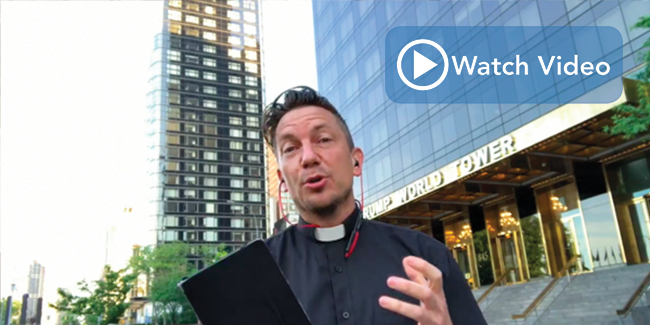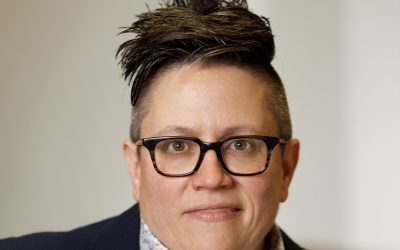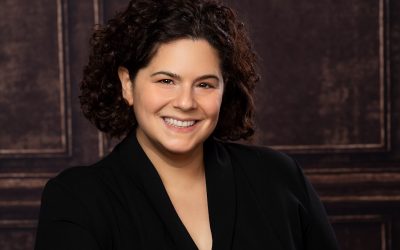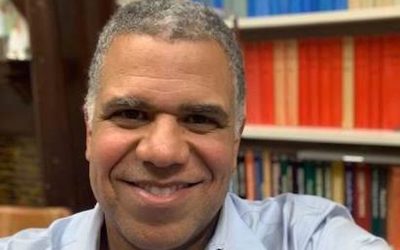Two Theological School community members—Brian Moll, a DMin student, and Brian James Tipton T’11,’14—speak out as allies against racism in two distinct sermons.
Brian Moll, Doctor of Ministry student at Drew Theological School
Brian Moll”s powerful street sermon on repentance, change and anti-racial work is an honest and powerful witness address to white America about anti-racist work and revolutionary love.
A Sermon by Brian James Tipton T’11,’14
PhD Candidate, New Testament & Early Christianity, Graduate Division of Religion
Certified Deacon Candidate, First United Methodist Church, Costa Mesa
Enlarge
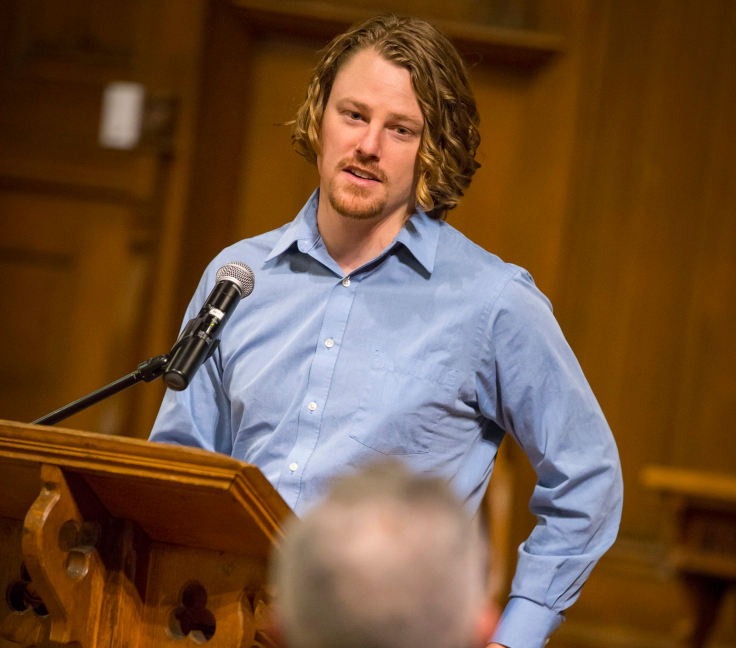
Foreword From Brian James Tipton: As an engaged member of First United Church of Costa Mesa (referred to as First United going forward) that runs our community groups, a member of our leadership board, and as junior scholar engaged in the work of race and ethnicity with my PhD dissertation on the Gospel of Mark, I feel called to draw attention to the roles and responsibilities of white folk and their response to racism within the church as well as within larger systems – to call attention to the need for anti-racism within our churches, communities, and the nation at large. This is an adapted version of a sermon preached to a predominantly white congregation in Southern California. Adaptations were made to make it readable for a general audience outside the confines of our congregation, but the heart of the message remains the same – a call to action and work for white folks and a making space for rest for People of Color. Of course, the large majority what I discuss below would be applicable to the majority of predominantly white churches in the United States, and thus the transition from my original sermon to this version was straightforward.
Rest and Racism: Seasons of the Yoke (Mt. 11:16-19, 25-30)
“But to what will I compare this generation? It is like children sitting in the marketplaces and calling to one another, ‘We played the flute for you, and you did not dance; we wailed, and you did not mourn.’ For John came neither eating nor drinking, and they say, ‘He has a demon’; the Son of Man came eating and drinking, and they say, ‘Look, a glutton and a drunkard, a friend of tax collectors and sinners!’ Yet wisdom is vindicated by her deeds.” At that time Jesus said, “I thank you, Father, Lord of heaven and earth, because you have hidden these things from the wise and the intelligent and have revealed them to infants; yes, Father, for such was your gracious will. All things have been handed over to me by my Father; and no one knows the Son except the Father, and no one knows the Father except the Son and anyone to whom the Son chooses to reveal him. Come to me, all you that are weary and are carrying heavy burdens, and I will give you rest. Take my yoke upon you, and learn from me; for I am gentle and humble in heart, and you will find rest for your souls. For my yoke is easy, and my burden is light.”
Matt 11:16-19, 25-30 (NRSV)
I want you to stop for a moment. Take a deep breath, get comfortable in your seat, and remember the first time you arrived at First United. Feel it in your body, in your bones. Imagine walking in and sitting down in the pews for the first time. Was it heavy, or was it light? Was it a space where you felt a burden lifted? Had you been spurned at your previous church, kicked out because of who you are, who you loved, or what you looked like?
I can remember the first time I stepped into that space. I can remember walking in with my spouse, sitting down in the wooden pews with so much air around me, the wind blowing through the open windows, Quinton playing the banjo, I sensed that I had arrived at somewhere that felt like… home. A weight had been lifted. My burden was light, and the community felt like family. I looked over at Christine and we both smiled, we knew we had arrived.
In reflecting on my experience of arriving at First United it was so obvious what Church was supposed to be. A place where folks feel light, where they are not spurned, where they are not kicked out for being and living into who they are. It is a place of rest for the weary. It is where our burdens are lifted off of our shoulders, as if a heavy yoke was being removed. A few weeks ago I was in a conversation with folks from First United and jotted down some of the ways that our community was described. One member described First this way: “a place to rest as you transition in your faith.” Another said that it is a “gentle place to share your inner thoughts, to let your soul rest.” Finally, another said that, “at First I found a spiritual family where I could share the burdens, the weight of my spiritual journey. Before that I shut up for a very long time… I was journeying alone. I needed to share my burdens.” In this sense the community of First United functions as the incarnation of the living God, of Christ in the world for those that need a new yoke, a lighter yoke, a place of rest. I see the Church as needing to function in that same space – providing rest for the weary.
But, this did not whimsically happen. It was not happenstance. There was work to make this happen, for us to be able to show up and feel that lifting of burden off of our shoulders. Work that we need to continue to participate in so that other folks are able to experience that version of Christ in the world. We are being asked to continually transform ourselves and our community to make the yoke easier, to live into what John Wesley called Christian Perfection, not mimic the difficulties of this world.
What seems to be often hidden in this text, and when it is used, is that though the yoke is lifted, it is still replaced by another less heavy yoke. Too often I have heard this text preached in a way that made it so that Jesus comes in, takes off all the weight (you know, if you believe the right way and believe the right things), and then you are done. But note there is still a yoke, which means that in the community of God, in the kin-dom of God, there is still work to do.
In our community, that means working together to create a space where we can lay down our burdens and find rest for our souls, to create a gentle place where we can transition in our faith and transform ourselves. God works in the midst of this, God guides this process, but we are called to play a role in making this possible, and we have seen it take place at First United. In First United, through our shared work, folks are finding a place to rest their souls in a burdensome and weary world.
The question then becomes: What makes that yoke lighter? I believe it is two things. First, that we are living life with a God that is there with us, that is in the midst of our heavy burdens with us, helping us, guiding us, taking some of that weight off of us. But the other aspect is that a yoke, in its original agricultural context, was carried by two oxen. It is a type of work that is done in pairs. That is, we do not carry the weight of our work alone, but together, in the midst of our community. We have to be the incarnate Christ with and for one another to make the burden lighter, and to allow each other rest – as individuals, and as the body of Christ, as the Church. While the world may teach us to take care of ourselves alone, a yoke that is easy is one where we bear it together, creating a kin-dom in the here-and-now where we celebrate with each other, dancing when the flutes are played, and mourning with one another, being Jesus with and for one another, showing up, being transformed. First United exists to remind us that we are already loved by God, and to be a place of rest for our souls and lay down our burdens together. But we have to do this together. We are invited by God to be transformed and to transform the world around us, to enact the kin-dom of God in the here-and-now.
With that said, there is something else I believe that is important to address in the time that we are living. The weight carried by black and brown folks in the midst of racial tensions and uprisings in the U.S. The weight of racism carried on the shoulders of black and brown bodies in the form of a heavy yoke that they have carried on the soil of this nation since before its inception. A yoke that started with slavery, with the owning of black bodies, and now exists in every part of our daily lives. We are actively seeing the response of folks that have carried that burden for far too long.
This part of my message is meant for my white siblings in the Church, at First United. I am reminded of the book of Ecclesiastes chapter 3, “for everything there is a season, and a time for every matter under heaven.” You see, there are seasons for rest and there are seasons for work. This, clearly, is a season for work. For so long black and brown bodies have carried the yoke of racism within the U.S., a yoke they had no part in enacting, of creating. It is far past due for white folks to carry that burden. It was and is our problem, it was and is caused by us, and we are the ones that inherently benefit from racist systems and structures within the U.S. It is time for us to carry that burden, for us to take on that yoke and create the structural and systematic change in the U.S., to demand something new, something different, to demand that the kin-dom be enacted in the world through the changing of policies and structures that have kept black and brown bodies over-policed, over-incarcerated, and over-burdened for too long. We are called to show up, to be the incarnate Christ in the world to lift that weight, to take on the heavy yoke and to enact the justice and righteousness (δικαιοσύνη) of God.
But that does not mean that we become the white savior. No, we are called into this work because, simply stated, we have benefited from racist policies, procedures, histories, and ideologies from the day we were born, privileges that we did not earn, but that we have perpetuated and participated in, often unknowingly. It is why black women are 4 times more likely to die from pregnancy or childbirth related causes (literally we are more likely to have our mothers in our lives because of the color of our skin and how systems, even healthcare systems, respond to that). It is why white folk do not have to think about what they have to wear, what voice they need to use, or how they need to act in order to avoid being discriminated against in their day-to-day lives. Shopping, dining out, driving, walking, breathing. Even sleeping. We do not have to fear that if we do these things wrong then we may be harassed, arrested, or our lives taken – that we will be profiled due to the color of our skin. We do not live with this uncomfortable reality, and it is why we are called to respond. God calls us into a space to stand with the oppressed, to stand with those on the margins who have been smothered by an Empire that does not want us to say their name. Breonna Taylor. Philando Castille. George Floyd. Kids like Trayvon Martin, Tamir Rice and Aiyana Stanley-Jones. And lest we forget Christian prejudices against Black queer folk, folks like black trans women Dominique Rem-mie Fells and Riah Milton, black trans man Tony McDade, and so, so many more. It is our job to take up that yoke. To repeat over and over again that Black Lives Matter. It is time for us to wake up to the fact that, though we may have not personally written these policies, it is time for us to own our own privilege. We need to take part in the dismantling of systems that marginalize people of color, that takes their lives, that murders them – and that we benefit from every moment that we take a breath. We need to bear one another’s burdens, the heavy yoke of racism. So, the question becomes, what does it look like to do that work? To carry the burden of racism, or rather, the burden of dismantling racism in our world?
This work is going to be uncomfortable. Robin DiAngelo, whose work focuses on racial and social justice, notes that “we will not move forward in race relations if we remain comfortable.”[1] We all come to this discussion at a different point, having had different conversations and different life experiences. There are various stages to this work that I will briefly outline in a bit, but what is important to note is that in each stage, you will need to get uncomfortable in order to move forward, in order to begin to dismantle racism in your personal life, but also within the larger structures that you inhabit and come into contact with.
So what are the stages of racism, and where do you find yourself?[2]
You may feel the need to say that you do not see color, that humans are humans. In essence, that you are not racist if you do not actively pursue racist actions. Here is the thing about this: it erases the lived experience of people of color and hides your own privilege. It is a way of exiting the conversation on race before it even starts.
You may be in a place where you feel stuck, like you feel bad for being white. “White guilt” is a real thing and for many white people, it is a stage in the conversation where we freeze, unable to move on from it. Education is the best way to move forward. If you attend trainings, join with allies, if you work to grow, then you will be able to move on from that space. But first, recognize if you are in that space, sit with it for a bit, and then educate yourself about it.
You may feel like you have gotten past that, that it is not your fault that you are white and that you have black friends, black relatives, even black children. You may begin to feel defensive about your whiteness, or you may find yourself feeling a sense of shame. Keep pressing forward.
You may have even gotten past this stage, that you understand your own privilege, but you still turn to your friends that are people of color for affirmation, putting the pressure back on them, putting them in a place to address racism, even your own. Consider thinking about how you may use your own privilege to dismantle racism.
You may be fully immersed in the work of anti-racism, you may have recognized your own identity and how you will need to continually grow, that we never fully arrive in this work.
In each of these stages there will be discomfort. There will be reminders of your own privilege that you did not realize or that you forgot about. You may hear stories that make you cringe (both at yourself and for others), but it is in this engagement that we grow, that we learn better who we are, but also learn better the life experiences of your siblings of color – life experiences that are very different from our own.
As you navigate where you are I am going to provide a digital document (produced by two Master of Divinity students, Anna Stamborski and Nikki Zimmermann, and Bailie Gregory, M. Div, M.S. Ed.) that many have found helpful in navigating the space of racism and what it means to be a white person interested in race relations today.[3] I say that to say, don’t reinvent the wheel. We live in a moment where there are resources compiled for you, where the work is already being done and you just have to jump on-board. This yoke is one that will, at times, feel uncomfortable. The self-reflection, prayer, learning, and action will be difficult. The action steps will be hard. But we carry the burden together, and the work of navigating all this has been done. See the digital document resource that provides activities, movies, podcasts, articles, books, and so many different avenues to move you forward in this lifelong work for justice. But here are some tips for where you are right now, most of which are outlined on the resource I am providing[4]:
Educate yourselves. We all come to the conversation around race at different points and with different experiences. Some of us will feel comfortable thinking and talking about this, but many of us will not. Stop. Listen. Read. Watch. Learn better your own privilege and how it shapes your world and your experiences, then learn to use that privilege to help others. Do NOT turn to your black and brown friends to provide the answers, to educate you. As you look to educate yourself, do so by incorporating and listening to the voices of black folks. Amplify black voices in your life. Learn what it means to be non-white in the U.S. Center non-white voices in your education. Do so in a critical manner. If you find yourself looking to black folks that are generally supported by white folks and that black folks are generally critical of, that should tell you something. Pay the folks that already do this work. Buy from black authors. Attend paid workshops on racism led by black folk. Do not expect black folks to educate you for free, they already bear the yoke of racism – they shouldn’t bear the weight of dismantling racism.
Second, it is important to check-in on your friends and family that are people of color. Make sure you are doing it for them, not for yourself. Provide space for them to be heard and supported – to have the weight of the yoke lifted. Remember, they may not be in a space where they are able or willing to share.
Third, know that being apolitical is not an option for oppressed people. If you do not care about politics, then the laws and systems are likely on your side. Get engaged. Get political. Show up and act. Resist the urge to go back to normal. Do not disengage, do not be lukewarm in matters of justice. Work for racist policies to be changed. As an individual, call and write local, state, and federal officials. Register to vote, vote, and call on others to as well. Have your voice be heard. When folks are wailing, show up and weep with them. Then turn that mourning into action. Jesus showed up, so we are called to as well. As a community, protest and march, show up when your community shows up. Have your communal voice be heard.
Fourth, vote with your dollars. Support black owned businesses. Do the work to find restaurants and businesses owned by black folk. Don’t spend your cash at places that support systems of injustice. Donate money to organizations committed to dismantling systems of injustice and that work to remedy racial injustice. Some examples include the NAACP Legal Defense Fund, the Equal Justice Initiative, National Bail Out.
Finally, as you learn more about racism, remember that you are a child of God. Take moments to pause, to reflect on what you are learning, and invite God into this space with you. Pray, let the Spirit move, and remember that this is a lifelong journey. In the moments of rest God will work, and it will make the work that we are doing more sustainable. Be willing to celebrate.
I want to end with a short message to our black and brown siblings in the Church, since, for the love of God, I am the last person that should be preaching to or at you. I want you to hear the message of Jesus as it is – a call to rest. Jesus is making space for you to be able to take the road of rest, to have your burden lifted. I want to recognize that some of you are called to do the work that is being done right now, and to note that your prophetic work is righteous and just. Some of you may be called to this work, but if not, I want you to take the message of Jesus to heart. If you are weary, if you are carrying the heavy burden, if you sense the need to opt out, the need to exit conversations with folks that simply don’t get it, walk away. If you are able, redirect them to someone that is called to this work. If we are truly the community that Jesus imagined, if we consider ourselves the incarnate Christ, the community that folks can turn to in order to lighten that burden, then there are folks here that you should be able to deflect to. I would hope that you have leaders in your community in that light. If not, then the community has much work to do, and we all do it together.
After all, we are called to continually transform ourselves and our community to make the yoke easier, to live into what John Wesley called Christian Perfection, not perpetuate the difficulties of this world. For everything there is a season, a season of work, but also a season of rest. What is your season calling you into?
[1] Robin DiAngelo, White Fragility: Why It’s So Hard for White People to Talk About Racism (Boston: Beacon Press, 2018), 14.
[2] These are loosely based on the stages outlined by Janet Helms. Janet E. Helms, A Race Is a Nice Thing to Have: A Guide to Being a White Person or Understanding the White Persons in Your Life (Cognella, 2020). See also, https://bit.ly/3drGV3z.
[3] https://bit.ly/3drGV3z
[4] Additionally see Marie Beecham, https://www.instagram.com/wastefreemarie/, and in particular, https://www.instagram.com/p/CBJOQl3BbrT/?igshid=14jh7foz5m797.
